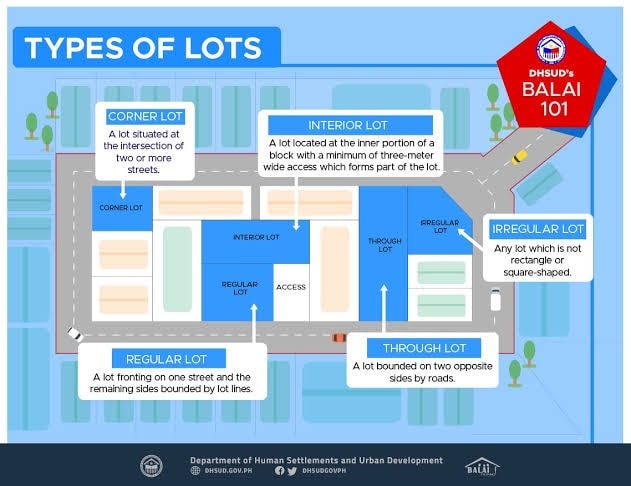Know Your Lot: Discover the Different Types of Lots!

Understanding the different types of lots in a subdivision is crucial for any real estate transaction. Whether you’re investing in a commercial, residential, industrial, agricultural subdivision, or a planned unit development, knowing the lot types helps you make informed decisions. Here’s an in-depth look at the various lot types you might encounter:
1. Regular Lots
Definition: Regular lots are the most common type of lot in a subdivision. They are typically rectangular in shape and are surrounded by other lots on all sides.
Features:
- Uniform in size and shape.
- Offers straightforward building options.
- Generally easier for planning and development.
2. Corner Lots
Definition: Located at the intersection of two streets, corner lots have more visibility and accessibility compared to regular lots.
Features:
- More exposure to traffic.
- Greater flexibility in building orientation.
- Typically larger, providing more yard space.
3. Through Lots
Definition: Also known as double-frontage lots, through lots have frontage on two parallel streets.
Features:
- Access from two streets can be beneficial.
- Greater potential for curb appeal.
- Privacy concerns due to exposure on both sides.
4. Corner-Through Lots
Definition: A combination of corner and through lots, these lots are located at the intersection of two streets and also have frontage on a parallel street.
Features:
- Maximum exposure and accessibility.
- Ideal for commercial properties due to high visibility.
- Potential for complex design and layout.
5. Flag Lots
Definition: Shaped like a flag on a pole, flag lots are characterized by a narrow “pole” access strip leading from the street to the main “flag” portion of the lot.
Features:
- Increased privacy as the main portion is set back from the street.
- Unique layout can pose design challenges.
- Limited street frontage.
6. Key Lots
Definition: Located in the middle of a block, key lots are bordered by other lots on three sides.
Features:
- Typically larger than regular lots.
- Limited street frontage.
- Increased privacy but can feel boxed in.
7. Interior Lots
Definition: These lots are surrounded by other lots on all sides and typically have access from a single street.
Features:
- Less exposure to traffic and noise.
- Often rectangular in shape.
- Suitable for residential use with fewer design constraints.
8. T-Lots
Definition: Named for their shape, T-lots are located at the end of a T-intersection where the street directly faces the lot.
Features:
- Unique positioning at the end of a street.
- Potential for increased traffic and noise due to intersection location.
- Creative design opportunities due to the unconventional shape.
Why Understanding Lot Types Matters
Knowing the type of lot you are purchasing helps you plan effectively. Each lot type comes with its own set of advantages and challenges, influencing factors like building design, privacy, exposure, and access. For instance, corner lots might offer more design flexibility and visibility, making them ideal for commercial purposes, whereas regular or interior lots might be better suited for residential developments due to their simplicity and privacy.
Making an Informed Decision
When considering a lot for purchase, evaluate its type in the context of your needs:
- Residential Buyers: Consider privacy, ease of development, and the nature of the surrounding lots.
- Commercial Buyers: Look for high visibility, ease of access, and potential for customer traffic.
- Developers: Assess the lot’s suitability for the intended use, including any zoning restrictions and development potential.
By understanding these different types of lots, you can make more strategic and informed decisions, ensuring that the property you choose aligns with your goals and requirements. Whether you’re building a home, starting a business, or investing in property, the right lot type can significantly impact the success and satisfaction of your real estate venture.

